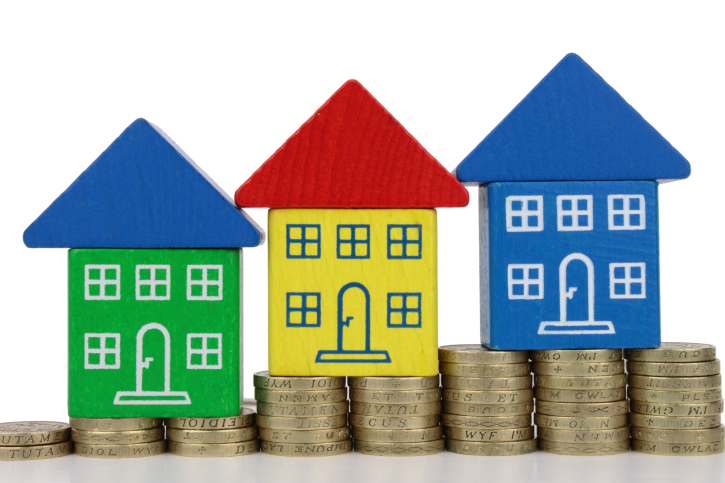 Finding the right mortgage can be a struggle. There’s a wide array of mortgage products on the market, and you don’t always need to get a mortgage through your bank – and with so many options, it’s hard to know which one is your best bet.
Finding the right mortgage can be a struggle. There’s a wide array of mortgage products on the market, and you don’t always need to get a mortgage through your bank – and with so many options, it’s hard to know which one is your best bet.
Your ideal mortgage will depend on your own individual financial situation, but when you understand how different kinds of mortgages work, it’s easier to choose the right one. Here’s what you need to know about mortgage types.
Fixed-Rate Mortgages: Home Financing At A Guaranteed Rate
A fixed-rate mortgage is exactly what it sounds like: A mortgage with a fixed interest rate. With a fixed-rate mortgage, your interest rate is locked for the life of the mortgage loan and cannot change.
When interest rates are at historical lows, a fixed-rate mortgage is an ideal financing option. By purchasing a fixed-rate mortgage at a low interest rate, buyers lock in low payments and are protected from sudden rate increases. However, fixed-rate mortgages are more difficult to qualify for when interest rates are high.
Variable-Rate Mortgages: Lower Rates And Larger Loans
A variable-rate mortgage is a mortgage wherein the interest rate fluctuates over time. Typically, the interest rate will stay constant during a set period of time near the start of the mortgage, and then start to vary. These mortgage rates rise and fall in line with the prime lending rate.
The major advantage of a variable-rate mortgage is that its lower initial rates and payments allow buyers to qualify for larger homes. Buyers can also take advantage of falling interest rates without having to refinance. However, variable-rate mortgages can quickly become expensive if interest rates see a sharp rise – and while some mortgages put caps on the maximum annual increase, these caps don’t usually apply to the first rate change.
Interest-Only Jumbo Mortgages: Flexible Terms For Wealthy Buyers
An interest-only jumbo mortgage is a specialty mortgage designed specifically for wealthy buyers purchasing luxury homes. The major advantage of this kind of mortgage is that borrowers can make interest-only payments for the first 10 years of the loan. However, interest-only mortgages are typically only available to well-heeled buyers who can afford a hefty down payment and prove that they have large cash reserves.
Finding the right mortgage can be a challenge. That’s why it helps to consult with a mortgage advisor who understands the terms and rates, and can negotiate a great deal for you. For more information, contact your trusted real estate professional.
 If you’re considering whether home ownership is the right decision for you, there are lots of different factors you’ll want to take into account. Do you want to keep moving around, or are you ready to lay down roots in a community? Are you prepared for the additional upkeep that home ownership requires?
If you’re considering whether home ownership is the right decision for you, there are lots of different factors you’ll want to take into account. Do you want to keep moving around, or are you ready to lay down roots in a community? Are you prepared for the additional upkeep that home ownership requires? Credit is of considerable concern when it comes to buying a home, but if you’re on the market for a new place in the next few months there may be some timely news that applies to you. If you haven’t heard about the changes to the Federal Housing Administration’s (FHA) credit score minimum, here’s some information on the recent reduction and how it may impact your home purchase.
Credit is of considerable concern when it comes to buying a home, but if you’re on the market for a new place in the next few months there may be some timely news that applies to you. If you haven’t heard about the changes to the Federal Housing Administration’s (FHA) credit score minimum, here’s some information on the recent reduction and how it may impact your home purchase. A monthly mortgage can seem like enough of a financial responsibility on its own, but there are many factors involved in home ownership that affect its fiscal feasibility. If you’re in the market for a house and are wondering how your income will stack up against the rest of your expenses, here’s how to determine a home cost that’s reasonable for you.
A monthly mortgage can seem like enough of a financial responsibility on its own, but there are many factors involved in home ownership that affect its fiscal feasibility. If you’re in the market for a house and are wondering how your income will stack up against the rest of your expenses, here’s how to determine a home cost that’s reasonable for you. Traditionally, getting a mortgage requires you to have a level of income appropriate to the size of home that you’re buying. But for a lot of low-income and minority borrowers, a simple measure of one person’s income isn’t an accurate measure of whether or not that person can afford a home.
Traditionally, getting a mortgage requires you to have a level of income appropriate to the size of home that you’re buying. But for a lot of low-income and minority borrowers, a simple measure of one person’s income isn’t an accurate measure of whether or not that person can afford a home. Buying a home isn’t cheap. But if you’re determined to become a homeowner, the FHA home loan program can help. This loan program, ideal for first-time buyers with low incomes, can help you to build your credit and make home ownership a reality.
Buying a home isn’t cheap. But if you’re determined to become a homeowner, the FHA home loan program can help. This loan program, ideal for first-time buyers with low incomes, can help you to build your credit and make home ownership a reality.